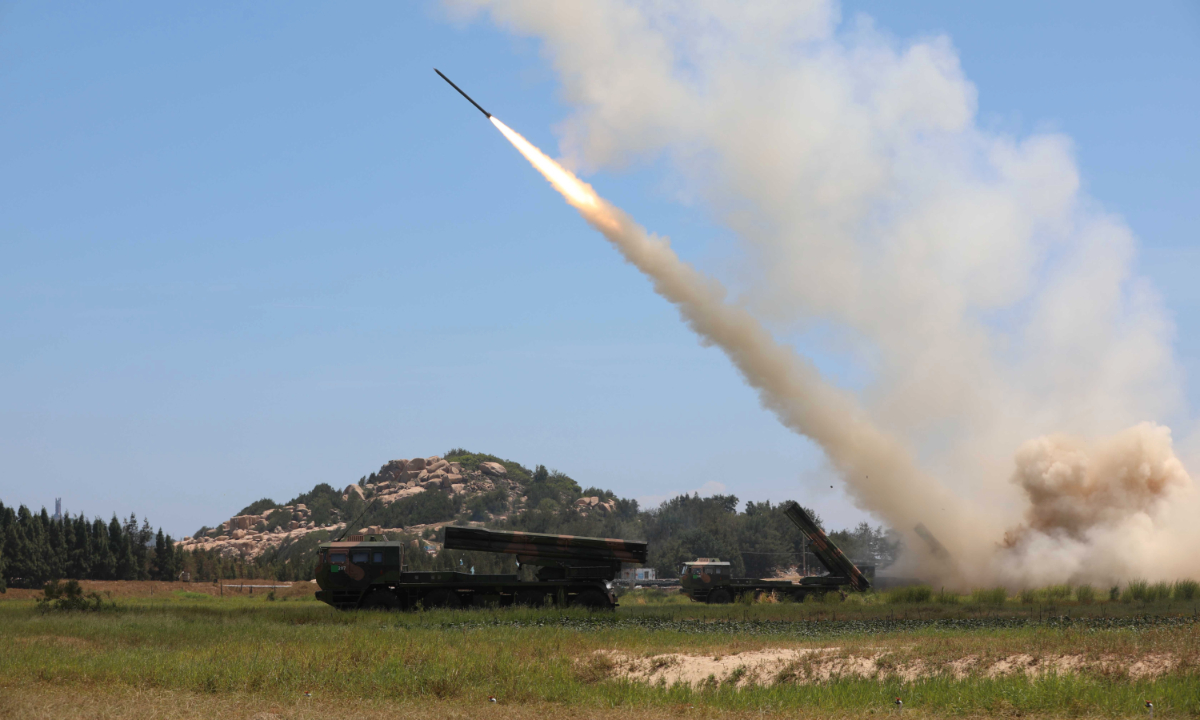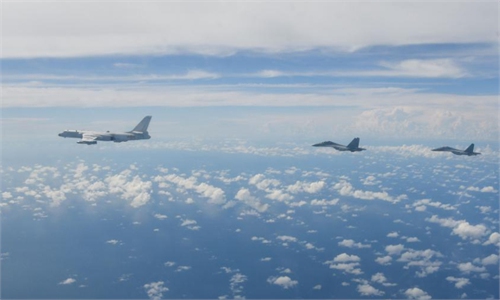Washington’s provocations will increasingly lead to misjudgment by Taiwan authorities, risking triggering Anti-Secession Law

The army of the Eastern Theater Command of the Chinese People's Liberation Army (PLA) conducts long-range live-fire drills in the Taiwan Strait, Aug. 4, 2022. The Eastern Theater Command on Thursday conducted joint combat exercises and training around the Taiwan Island on an unprecedented scale. Photo:Xinhua
Twelve days after US House Speaker Nancy Pelosi's provocative Taiwan trip, a delegation of five US lawmakers arrived on the island of Taiwan on Sunday for an unannounced two-day visit. On the same day, the People's Liberation Army (PLA) sent 22 military aircraft and six warships for regular combat readiness security patrols in the Taiwan Straits. Some crossed the so-called median line which the mainland doesn't recognize.It seems Washington still hasn't learned the lessons from Pelosi's trip to Taiwan. In the face of reckless moves of these US lawmakers, the PLA has and will certainly take resolute countermeasures.
On Monday, PLA Eastern Theater Command announced the organization of joint combat patrol and drills around Taiwan island. Song Zhongping, a Chinese mainland military expert and TV commentator, said that PLA's military exercises would become a long-term, normalized and realistic combat-oriented event as long as the Taiwan secessionists don't stop their collusion with external forces.
In the face of increasing provocations from Washington, Song believes the PLA needs to continue enhancing its combat-readiness, especially preparing for a military struggle with the US in the Taiwan Straits.
According to Zhang Tengjun, deputy director of the Department for Asia-Pacific Studies at the China Institute of International Studies, this might include strengthening military exercises in the surrounding waters, warplane flights encircling the island, and even more missile tests in the Straits.
"The warnings from the mainland target both US politicians and Taiwan authorities, because apart from those US congress members, Taiwan authorities are also glad to see the visits of these politicians. This further manifests the collusion between Washington and Taiwan. Against such a backdrop, it is reasonable for us to take more countermeasures," said Zhang.
"Judging from the current situation, it should be said that our response has no limits. However, the degree of our countermeasures depends on how deeply Washington colludes with Taiwan authorities. If the collusion reaches a certain level that undermines the fundamental situation in the Taiwan Straits, then larger military countermeasures or the use of force to reunify the island is not impossible," he noted.
Right now, achieving peaceful reunification remains the first option of the Chinese mainland, but to realize the goal of reunification by force has never been ruled out from the plan to solve the Taiwan question. Article 8 of China's Anti-Secession Law has explained that the country "shall employ non-peaceful means and other necessary measures to protect China's sovereignty and territorial integrity" in the event that the "Taiwan independence" secessionist forces should act under any name or by any means to cause the fact of Taiwan's secession from China, or that major incidents entailing Taiwan's secession from China should occur, or that possibilities for a peaceful reunification should be completely exhausted.
Song argues that the condition for peaceful reunification could be lost in three scenarios. The first is when "Taiwan independence" forces make big moves, like holding an "independence referendum." The second is when foreign forces comprehensively involve themselves in the Taiwan question, including in military ways. The third is when social turmoil occurs and Taiwan loses control of their society.
When facing either one of the situations, the PLA will adopt non-peaceful means to resolve the Taiwan question, with a fundamental goal to stop Taiwan secession, prevent the people on the island from falling into dire misery, and block other countries from utilizing Taiwan island as a bridgehead to contain and confront China, Song continued.
The use of force is a warning signal to Taiwan secessionists and external forces such as the US that aim to help the island of Taiwan "achieve independence." But as provocations from US politicians continue to intensify, Taiwan authorities' misjudgments will increase - they will mistakenly believe that they have the firm support of the international community, especially Washington. In that case, "Taiwan independence" forces may take desperate risks to cross the red line of the Anti-Secession Law.
China should closely observe if the Biden administration truly understands the correct thing to do - to stop treading on the bottom line of the Taiwan question. If Washington continues to indulge politicians to provoke China, it will trigger greater and stronger countermeasures from the Chinese side, even at a level beyond bilateral relations.
As China's cancellations and suspensions of bilateral cooperation in several sectors after Pelosi's Taiwan visit have shown, the US' poor handling of the Taiwan question will affect its cooperation with China.
For China, the Taiwan question cannot be compromised. If the US goes too far on the Taiwan question, then it is indeed a question of peace or war. China has the resources to launch counterattacks. After all, most of the countries in the world agree with the one-China principle. Therefore, it is very likely that Washington's provocations will not be supported by the international community. If it insists in the wrong path, in the end, it will fail miserably like how it ended up in Iraq war and Afghanistan war, a professor from the Institute of International Relations at the China Foreign Affairs University told the Global Times.
When visiting Taiwan, US lawmakers often mention "shared values." But in fact, they only care about the actual benefits they can gain from their Taiwan trips, not the future of the island and its people.
Apparently, the US still fails to understand how important the resolution of the Taiwan question is to China and the Chinese nation. For China, which seeks to achieve national rejuvenation, the complete reunification of the motherland is one of the vital prerequisites. For China-US relations, the handling of the Taiwan question lies at the core of the entire relationship. China cannot and will never concede on the Taiwan question.
Therefore, in this sense, it is obvious that the Taiwan question has greater importance and seriousness than all other factors in the bilateral ties between Beijing and Washington, said Zhang.
The author is a reporter with Global Times. opinion@globaltimes.com.cn

